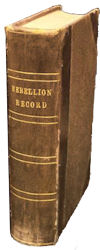
—Privateer No. 1—of the Confederate States—(the Savannah) captured May 3d, by U. S. brig Perry, arrived in the port of New York.—(Doc. 251.)
—The obstructions of the Baltimore and Ohio Railroad at Point of Rocks, Md., were removed, and the road was re-opened to Harper’s Ferry for the first time this morning since the occupation and obstruction of the road by the secessionists. The immense boulder, weighing about one hundred tons, thrown from the Point of Rocks upon the road by the Confederate troops, was removed last night by blasting, and the track now passes over its crushed fragments, which served to fill up the depression in the bed of the road, caused by its fall. An immense mass of the rock projects into the canal, leaving sufficient space, however, for the passage of the canal boats. The culverts which were attempted to have been blown up are now fully repaired, the solid character of the work rendering the attempted destruction but partial in extent.—Baltimore American, June 15.
—The First Massachusetts Regiment, under the command of Colonel Cowdin, left Boston for the seat of war.—(Doc. 252.)
—Jefferson City, Mo., was occupied by Gen. Lyon, in command of the Union force, who was warmly welcomed by the mass of the citizens. Gen. Lyon there learned that Gov. Jackson and the whole military and civil government of the State had fled to Booneville, forty miles above, and that they have not far from fifteen hundred men there, the most of them armed with their own rifles and shot-guns, six or eight iron cannon, and are throwing up earthworks to protect the town from attack, both by river and by land.—N. Y. Herald, June 20.
—An experiment with Sawyer’s American rifled cannon was made at the Rip Raps, in Hampton Roads. Seven of eleven 48-pound shells exploded a short distance from the rebel camp, on Sewall’s Point, and one of them over their intrenchments. It created a sensation among the secessionists. A house near the secession banner displayed a white flag.—N. Y. Times, June 18.


